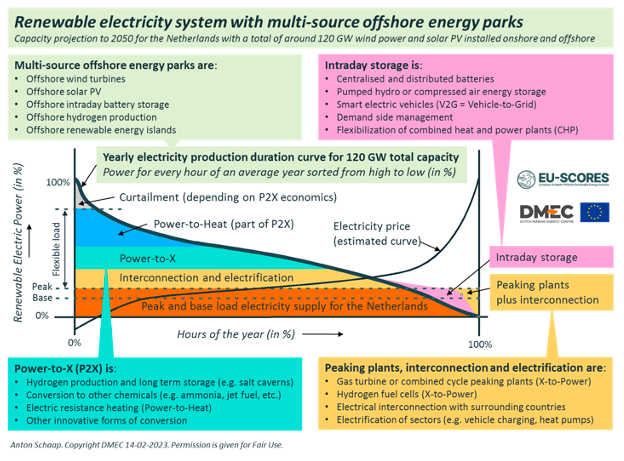Multi-source offshore energy parks can play an important role in our future renewable electricity system

25 May 2023
By Anton Schaap, Dutch Marine Energy Centre (DMEC)
The countries around the North Sea are building out a renewable energy system at a remarkable speed. Especially wind and solar capacity is added fast. In the Ostend Declaration of energy ministers, the energy ministers of Belgium, Denmark, Germany, France, Ireland, Luxembourg, the Netherlands, Norway and the UK have set targets to install 120 GW of offshore wind in 2030 and 300 GW in 2050 [1].
The Netherlands have set offshore wind targets of 21 GW in 2030 [2] and 70 GW in 2050 [3]. Recently the government also set a target of 3 GW offshore floating solar in 2030 [4].
Several countries, like Belgium, Germany, Denmark and the Netherlands, are also developing Energy Islands. These artificial islands will serve as hubs to which several multi-source offshore energy parks can be connected and on which multiple auxiliary systems can be installed like battery storage, power to X converters, data centers, HVDC equipment and interconnection with other countries. Also, maintenance services and accommodation for personnel can be installed on the islands.
Multi-source offshore renewable energy parks can play an important role in this emerging renewable energy system. By combining wind, solar and/or wave energy in one park, more efficient use can be made from the available space. The capacity factor of the whole park can be raised by combining different sources of renewable energy. In this way more efficient use of the electrica infrastructure can be made and the overall system costs are reduced.
In the DMEC led EU-SCORES project, the first multi-source offshore energy parks will be demonstrated. 16 partners from nine European countries, will demonstrate the first multi-source offshore energy parks (wind plus solar off the coast of Belgium and wind plus wave power off the coast of Portugal).
Read more in the full publication here.
For more information: anton@dutchmarineenergy.com
